BTEC Level 3: Meeting Individual Care and Support Needs Report
VerifiedAdded on 2022/12/26
|9
|1954
|59
Report
AI Summary
This report addresses the critical aspects of meeting individual care and support needs within a healthcare context, focusing on ethical principles and practical strategies. The report begins by emphasizing the importance of ethical working values and the need to consider individual choices, free will, client interests, and confidentiality. It then outlines strategies to overcome ethical issues, such as providing training and ensuring regular staff presence. The report further explores an ethical approach to support, including the application of consequentialism and virtue ethics, and the provision of counseling, advice, and shelter. It also examines strategies and techniques to overcome challenges, such as fostering interaction, providing practical orientation, and offering motivational support. Finally, the report highlights the significance of personalization and promotion, emphasizing the need to assess individual needs, provide unique identities, and offer mental benefits. The conclusion underscores the importance of ethical measures and the application of various strategies in healthcare settings.
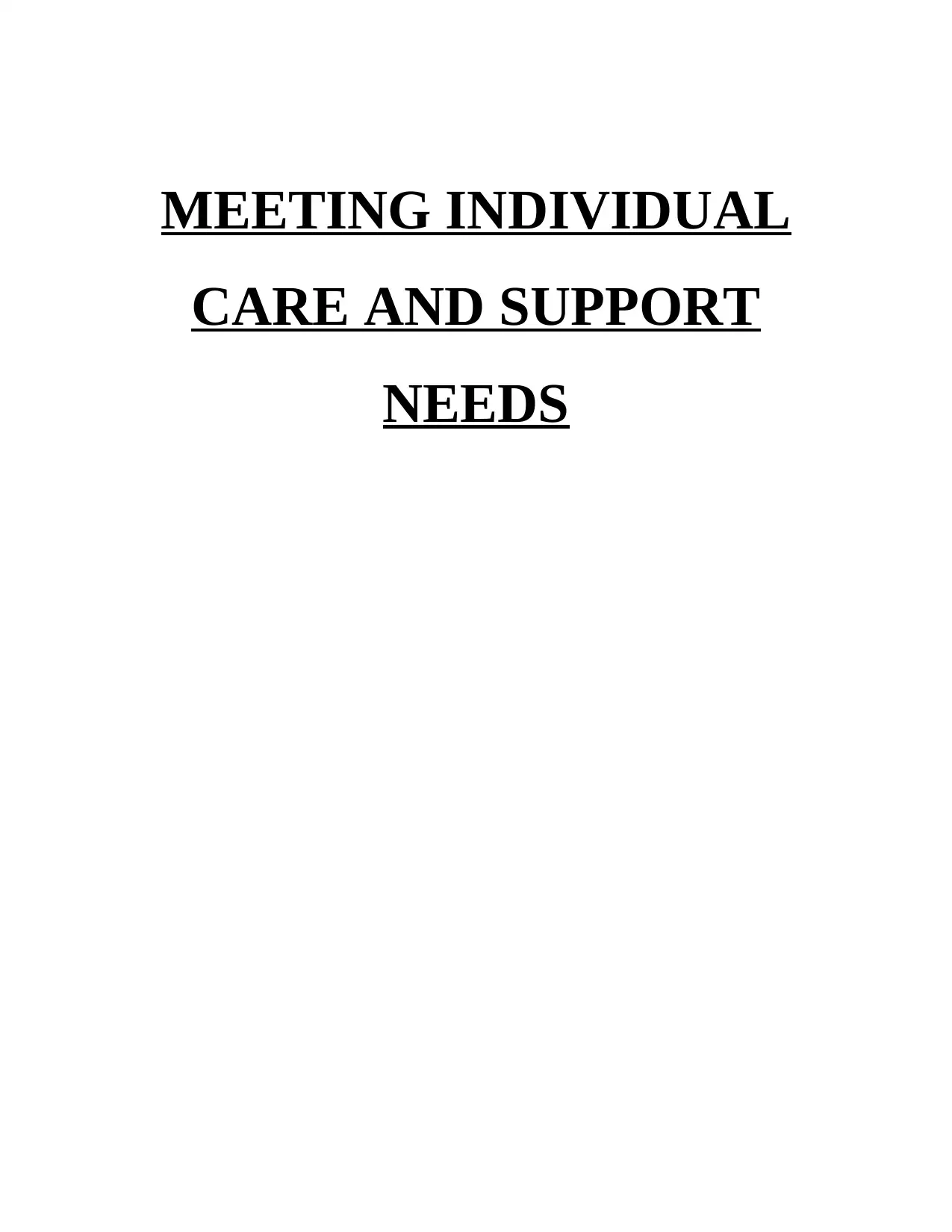
MEETING INDIVIDUAL
CARE AND SUPPORT
NEEDS
CARE AND SUPPORT
NEEDS
Paraphrase This Document
Need a fresh take? Get an instant paraphrase of this document with our AI Paraphraser
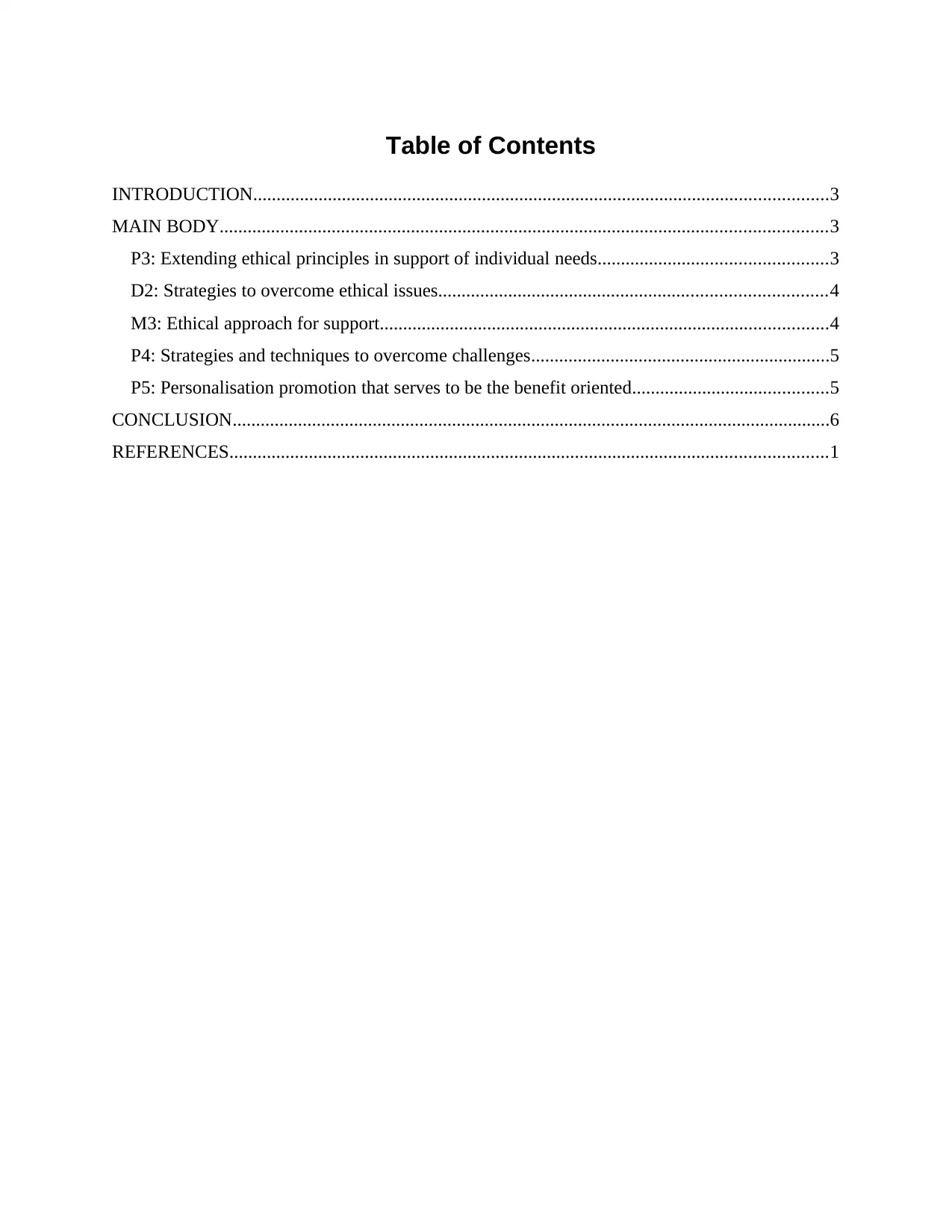
Table of Contents
INTRODUCTION...........................................................................................................................3
MAIN BODY..................................................................................................................................3
P3: Extending ethical principles in support of individual needs.................................................3
D2: Strategies to overcome ethical issues...................................................................................4
M3: Ethical approach for support................................................................................................4
P4: Strategies and techniques to overcome challenges................................................................5
P5: Personalisation promotion that serves to be the benefit oriented..........................................5
CONCLUSION................................................................................................................................6
REFERENCES................................................................................................................................1
INTRODUCTION...........................................................................................................................3
MAIN BODY..................................................................................................................................3
P3: Extending ethical principles in support of individual needs.................................................3
D2: Strategies to overcome ethical issues...................................................................................4
M3: Ethical approach for support................................................................................................4
P4: Strategies and techniques to overcome challenges................................................................5
P5: Personalisation promotion that serves to be the benefit oriented..........................................5
CONCLUSION................................................................................................................................6
REFERENCES................................................................................................................................1
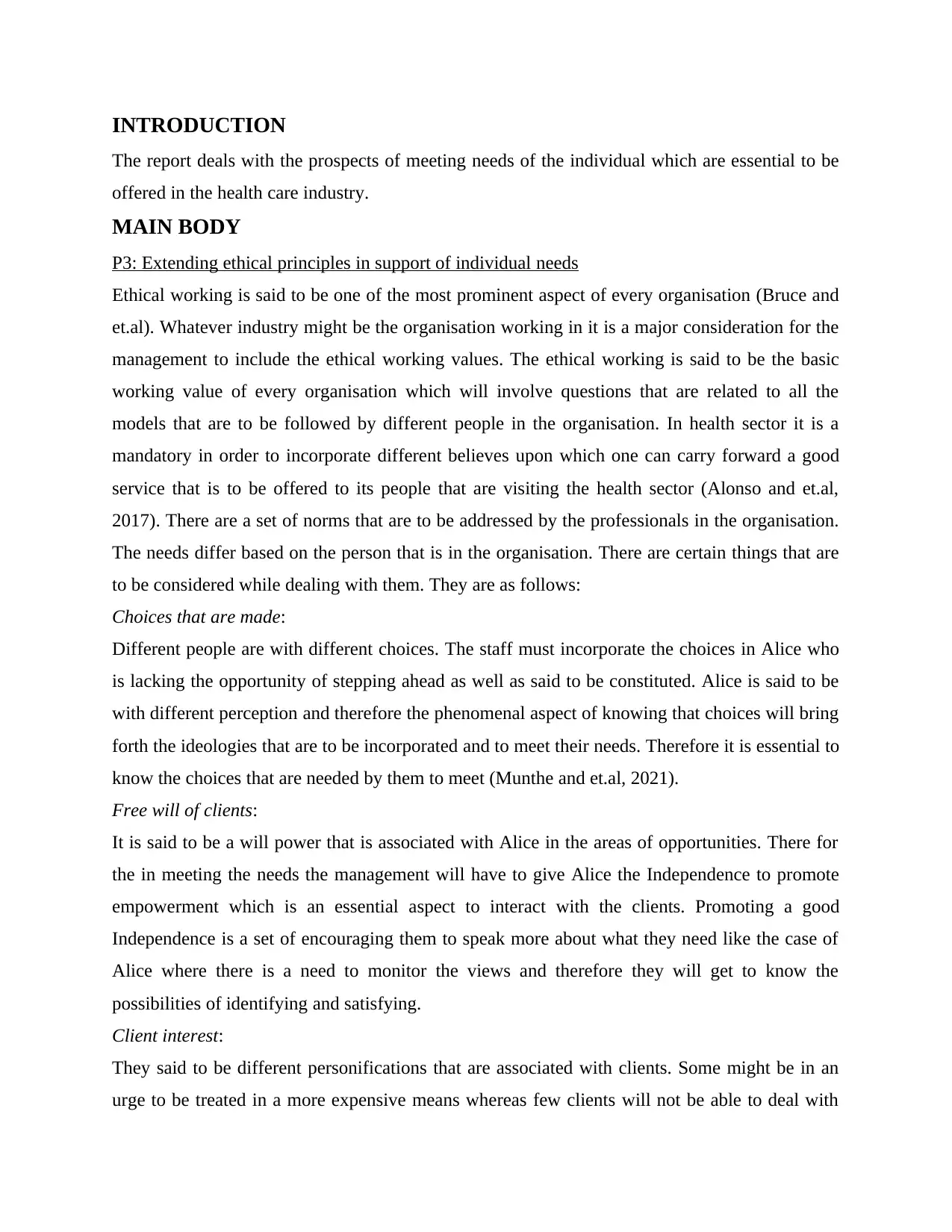
INTRODUCTION
The report deals with the prospects of meeting needs of the individual which are essential to be
offered in the health care industry.
MAIN BODY
P3: Extending ethical principles in support of individual needs
Ethical working is said to be one of the most prominent aspect of every organisation (Bruce and
et.al). Whatever industry might be the organisation working in it is a major consideration for the
management to include the ethical working values. The ethical working is said to be the basic
working value of every organisation which will involve questions that are related to all the
models that are to be followed by different people in the organisation. In health sector it is a
mandatory in order to incorporate different believes upon which one can carry forward a good
service that is to be offered to its people that are visiting the health sector (Alonso and et.al,
2017). There are a set of norms that are to be addressed by the professionals in the organisation.
The needs differ based on the person that is in the organisation. There are certain things that are
to be considered while dealing with them. They are as follows:
Choices that are made:
Different people are with different choices. The staff must incorporate the choices in Alice who
is lacking the opportunity of stepping ahead as well as said to be constituted. Alice is said to be
with different perception and therefore the phenomenal aspect of knowing that choices will bring
forth the ideologies that are to be incorporated and to meet their needs. Therefore it is essential to
know the choices that are needed by them to meet (Munthe and et.al, 2021).
Free will of clients:
It is said to be a will power that is associated with Alice in the areas of opportunities. There for
the in meeting the needs the management will have to give Alice the Independence to promote
empowerment which is an essential aspect to interact with the clients. Promoting a good
Independence is a set of encouraging them to speak more about what they need like the case of
Alice where there is a need to monitor the views and therefore they will get to know the
possibilities of identifying and satisfying.
Client interest:
They said to be different personifications that are associated with clients. Some might be in an
urge to be treated in a more expensive means whereas few clients will not be able to deal with
The report deals with the prospects of meeting needs of the individual which are essential to be
offered in the health care industry.
MAIN BODY
P3: Extending ethical principles in support of individual needs
Ethical working is said to be one of the most prominent aspect of every organisation (Bruce and
et.al). Whatever industry might be the organisation working in it is a major consideration for the
management to include the ethical working values. The ethical working is said to be the basic
working value of every organisation which will involve questions that are related to all the
models that are to be followed by different people in the organisation. In health sector it is a
mandatory in order to incorporate different believes upon which one can carry forward a good
service that is to be offered to its people that are visiting the health sector (Alonso and et.al,
2017). There are a set of norms that are to be addressed by the professionals in the organisation.
The needs differ based on the person that is in the organisation. There are certain things that are
to be considered while dealing with them. They are as follows:
Choices that are made:
Different people are with different choices. The staff must incorporate the choices in Alice who
is lacking the opportunity of stepping ahead as well as said to be constituted. Alice is said to be
with different perception and therefore the phenomenal aspect of knowing that choices will bring
forth the ideologies that are to be incorporated and to meet their needs. Therefore it is essential to
know the choices that are needed by them to meet (Munthe and et.al, 2021).
Free will of clients:
It is said to be a will power that is associated with Alice in the areas of opportunities. There for
the in meeting the needs the management will have to give Alice the Independence to promote
empowerment which is an essential aspect to interact with the clients. Promoting a good
Independence is a set of encouraging them to speak more about what they need like the case of
Alice where there is a need to monitor the views and therefore they will get to know the
possibilities of identifying and satisfying.
Client interest:
They said to be different personifications that are associated with clients. Some might be in an
urge to be treated in a more expensive means whereas few clients will not be able to deal with
⊘ This is a preview!⊘
Do you want full access?
Subscribe today to unlock all pages.

Trusted by 1+ million students worldwide
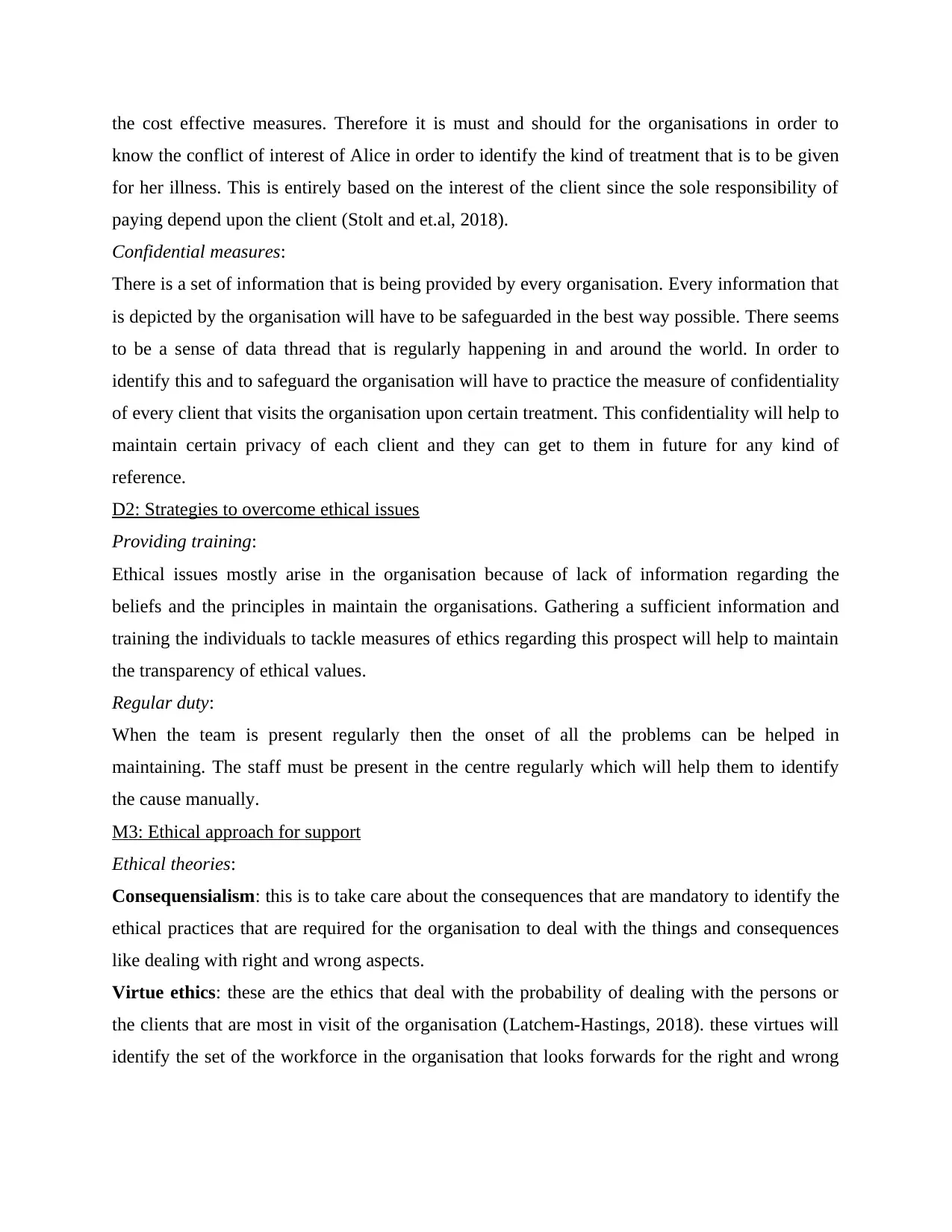
the cost effective measures. Therefore it is must and should for the organisations in order to
know the conflict of interest of Alice in order to identify the kind of treatment that is to be given
for her illness. This is entirely based on the interest of the client since the sole responsibility of
paying depend upon the client (Stolt and et.al, 2018).
Confidential measures:
There is a set of information that is being provided by every organisation. Every information that
is depicted by the organisation will have to be safeguarded in the best way possible. There seems
to be a sense of data thread that is regularly happening in and around the world. In order to
identify this and to safeguard the organisation will have to practice the measure of confidentiality
of every client that visits the organisation upon certain treatment. This confidentiality will help to
maintain certain privacy of each client and they can get to them in future for any kind of
reference.
D2: Strategies to overcome ethical issues
Providing training:
Ethical issues mostly arise in the organisation because of lack of information regarding the
beliefs and the principles in maintain the organisations. Gathering a sufficient information and
training the individuals to tackle measures of ethics regarding this prospect will help to maintain
the transparency of ethical values.
Regular duty:
When the team is present regularly then the onset of all the problems can be helped in
maintaining. The staff must be present in the centre regularly which will help them to identify
the cause manually.
M3: Ethical approach for support
Ethical theories:
Consequensialism: this is to take care about the consequences that are mandatory to identify the
ethical practices that are required for the organisation to deal with the things and consequences
like dealing with right and wrong aspects.
Virtue ethics: these are the ethics that deal with the probability of dealing with the persons or
the clients that are most in visit of the organisation (Latchem-Hastings, 2018). these virtues will
identify the set of the workforce in the organisation that looks forwards for the right and wrong
know the conflict of interest of Alice in order to identify the kind of treatment that is to be given
for her illness. This is entirely based on the interest of the client since the sole responsibility of
paying depend upon the client (Stolt and et.al, 2018).
Confidential measures:
There is a set of information that is being provided by every organisation. Every information that
is depicted by the organisation will have to be safeguarded in the best way possible. There seems
to be a sense of data thread that is regularly happening in and around the world. In order to
identify this and to safeguard the organisation will have to practice the measure of confidentiality
of every client that visits the organisation upon certain treatment. This confidentiality will help to
maintain certain privacy of each client and they can get to them in future for any kind of
reference.
D2: Strategies to overcome ethical issues
Providing training:
Ethical issues mostly arise in the organisation because of lack of information regarding the
beliefs and the principles in maintain the organisations. Gathering a sufficient information and
training the individuals to tackle measures of ethics regarding this prospect will help to maintain
the transparency of ethical values.
Regular duty:
When the team is present regularly then the onset of all the problems can be helped in
maintaining. The staff must be present in the centre regularly which will help them to identify
the cause manually.
M3: Ethical approach for support
Ethical theories:
Consequensialism: this is to take care about the consequences that are mandatory to identify the
ethical practices that are required for the organisation to deal with the things and consequences
like dealing with right and wrong aspects.
Virtue ethics: these are the ethics that deal with the probability of dealing with the persons or
the clients that are most in visit of the organisation (Latchem-Hastings, 2018). these virtues will
identify the set of the workforce in the organisation that looks forwards for the right and wrong
Paraphrase This Document
Need a fresh take? Get an instant paraphrase of this document with our AI Paraphraser
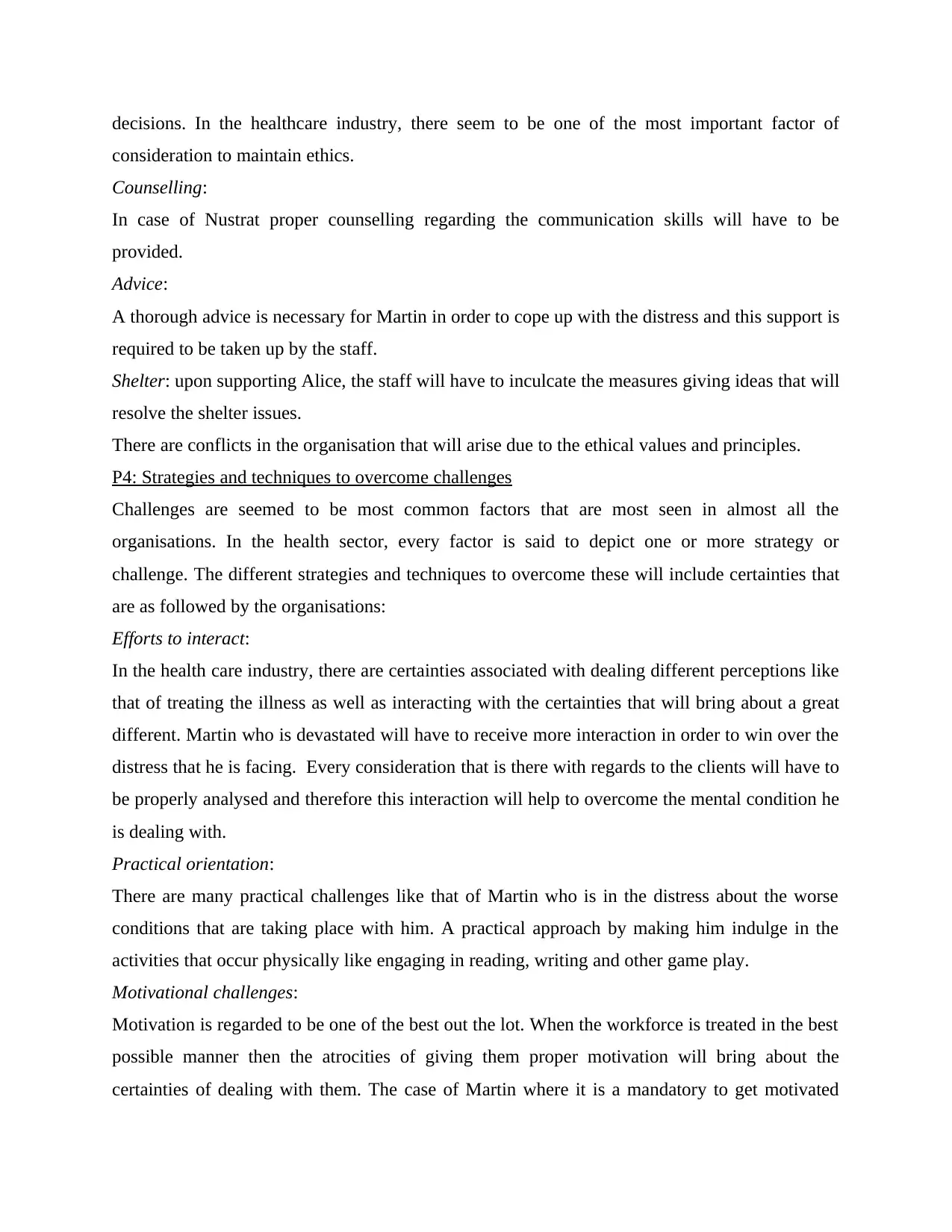
decisions. In the healthcare industry, there seem to be one of the most important factor of
consideration to maintain ethics.
Counselling:
In case of Nustrat proper counselling regarding the communication skills will have to be
provided.
Advice:
A thorough advice is necessary for Martin in order to cope up with the distress and this support is
required to be taken up by the staff.
Shelter: upon supporting Alice, the staff will have to inculcate the measures giving ideas that will
resolve the shelter issues.
There are conflicts in the organisation that will arise due to the ethical values and principles.
P4: Strategies and techniques to overcome challenges
Challenges are seemed to be most common factors that are most seen in almost all the
organisations. In the health sector, every factor is said to depict one or more strategy or
challenge. The different strategies and techniques to overcome these will include certainties that
are as followed by the organisations:
Efforts to interact:
In the health care industry, there are certainties associated with dealing different perceptions like
that of treating the illness as well as interacting with the certainties that will bring about a great
different. Martin who is devastated will have to receive more interaction in order to win over the
distress that he is facing. Every consideration that is there with regards to the clients will have to
be properly analysed and therefore this interaction will help to overcome the mental condition he
is dealing with.
Practical orientation:
There are many practical challenges like that of Martin who is in the distress about the worse
conditions that are taking place with him. A practical approach by making him indulge in the
activities that occur physically like engaging in reading, writing and other game play.
Motivational challenges:
Motivation is regarded to be one of the best out the lot. When the workforce is treated in the best
possible manner then the atrocities of giving them proper motivation will bring about the
certainties of dealing with them. The case of Martin where it is a mandatory to get motivated
consideration to maintain ethics.
Counselling:
In case of Nustrat proper counselling regarding the communication skills will have to be
provided.
Advice:
A thorough advice is necessary for Martin in order to cope up with the distress and this support is
required to be taken up by the staff.
Shelter: upon supporting Alice, the staff will have to inculcate the measures giving ideas that will
resolve the shelter issues.
There are conflicts in the organisation that will arise due to the ethical values and principles.
P4: Strategies and techniques to overcome challenges
Challenges are seemed to be most common factors that are most seen in almost all the
organisations. In the health sector, every factor is said to depict one or more strategy or
challenge. The different strategies and techniques to overcome these will include certainties that
are as followed by the organisations:
Efforts to interact:
In the health care industry, there are certainties associated with dealing different perceptions like
that of treating the illness as well as interacting with the certainties that will bring about a great
different. Martin who is devastated will have to receive more interaction in order to win over the
distress that he is facing. Every consideration that is there with regards to the clients will have to
be properly analysed and therefore this interaction will help to overcome the mental condition he
is dealing with.
Practical orientation:
There are many practical challenges like that of Martin who is in the distress about the worse
conditions that are taking place with him. A practical approach by making him indulge in the
activities that occur physically like engaging in reading, writing and other game play.
Motivational challenges:
Motivation is regarded to be one of the best out the lot. When the workforce is treated in the best
possible manner then the atrocities of giving them proper motivation will bring about the
certainties of dealing with them. The case of Martin where it is a mandatory to get motivated
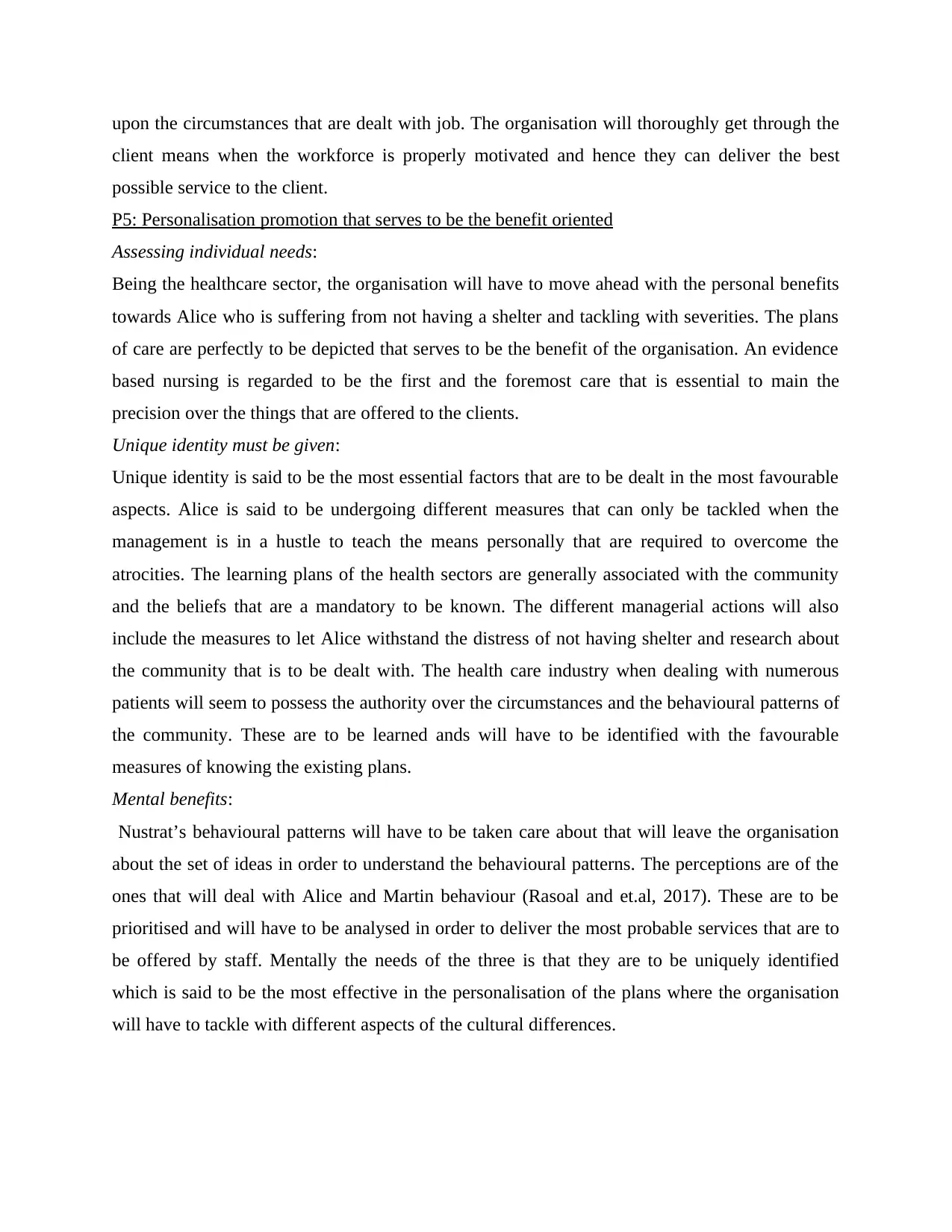
upon the circumstances that are dealt with job. The organisation will thoroughly get through the
client means when the workforce is properly motivated and hence they can deliver the best
possible service to the client.
P5: Personalisation promotion that serves to be the benefit oriented
Assessing individual needs:
Being the healthcare sector, the organisation will have to move ahead with the personal benefits
towards Alice who is suffering from not having a shelter and tackling with severities. The plans
of care are perfectly to be depicted that serves to be the benefit of the organisation. An evidence
based nursing is regarded to be the first and the foremost care that is essential to main the
precision over the things that are offered to the clients.
Unique identity must be given:
Unique identity is said to be the most essential factors that are to be dealt in the most favourable
aspects. Alice is said to be undergoing different measures that can only be tackled when the
management is in a hustle to teach the means personally that are required to overcome the
atrocities. The learning plans of the health sectors are generally associated with the community
and the beliefs that are a mandatory to be known. The different managerial actions will also
include the measures to let Alice withstand the distress of not having shelter and research about
the community that is to be dealt with. The health care industry when dealing with numerous
patients will seem to possess the authority over the circumstances and the behavioural patterns of
the community. These are to be learned ands will have to be identified with the favourable
measures of knowing the existing plans.
Mental benefits:
Nustrat’s behavioural patterns will have to be taken care about that will leave the organisation
about the set of ideas in order to understand the behavioural patterns. The perceptions are of the
ones that will deal with Alice and Martin behaviour (Rasoal and et.al, 2017). These are to be
prioritised and will have to be analysed in order to deliver the most probable services that are to
be offered by staff. Mentally the needs of the three is that they are to be uniquely identified
which is said to be the most effective in the personalisation of the plans where the organisation
will have to tackle with different aspects of the cultural differences.
client means when the workforce is properly motivated and hence they can deliver the best
possible service to the client.
P5: Personalisation promotion that serves to be the benefit oriented
Assessing individual needs:
Being the healthcare sector, the organisation will have to move ahead with the personal benefits
towards Alice who is suffering from not having a shelter and tackling with severities. The plans
of care are perfectly to be depicted that serves to be the benefit of the organisation. An evidence
based nursing is regarded to be the first and the foremost care that is essential to main the
precision over the things that are offered to the clients.
Unique identity must be given:
Unique identity is said to be the most essential factors that are to be dealt in the most favourable
aspects. Alice is said to be undergoing different measures that can only be tackled when the
management is in a hustle to teach the means personally that are required to overcome the
atrocities. The learning plans of the health sectors are generally associated with the community
and the beliefs that are a mandatory to be known. The different managerial actions will also
include the measures to let Alice withstand the distress of not having shelter and research about
the community that is to be dealt with. The health care industry when dealing with numerous
patients will seem to possess the authority over the circumstances and the behavioural patterns of
the community. These are to be learned ands will have to be identified with the favourable
measures of knowing the existing plans.
Mental benefits:
Nustrat’s behavioural patterns will have to be taken care about that will leave the organisation
about the set of ideas in order to understand the behavioural patterns. The perceptions are of the
ones that will deal with Alice and Martin behaviour (Rasoal and et.al, 2017). These are to be
prioritised and will have to be analysed in order to deliver the most probable services that are to
be offered by staff. Mentally the needs of the three is that they are to be uniquely identified
which is said to be the most effective in the personalisation of the plans where the organisation
will have to tackle with different aspects of the cultural differences.
⊘ This is a preview!⊘
Do you want full access?
Subscribe today to unlock all pages.

Trusted by 1+ million students worldwide
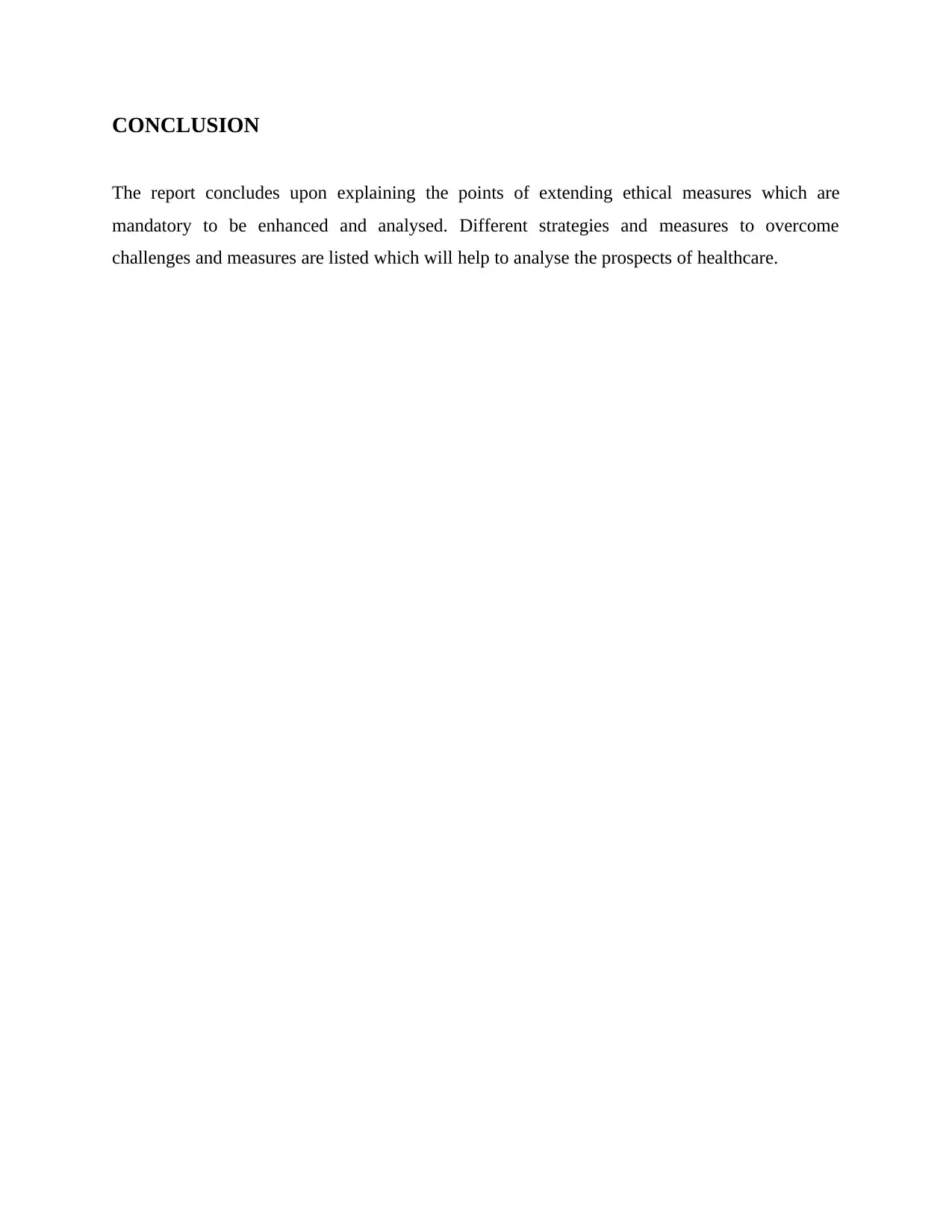
CONCLUSION
The report concludes upon explaining the points of extending ethical measures which are
mandatory to be enhanced and analysed. Different strategies and measures to overcome
challenges and measures are listed which will help to analyse the prospects of healthcare.
The report concludes upon explaining the points of extending ethical measures which are
mandatory to be enhanced and analysed. Different strategies and measures to overcome
challenges and measures are listed which will help to analyse the prospects of healthcare.
Paraphrase This Document
Need a fresh take? Get an instant paraphrase of this document with our AI Paraphraser
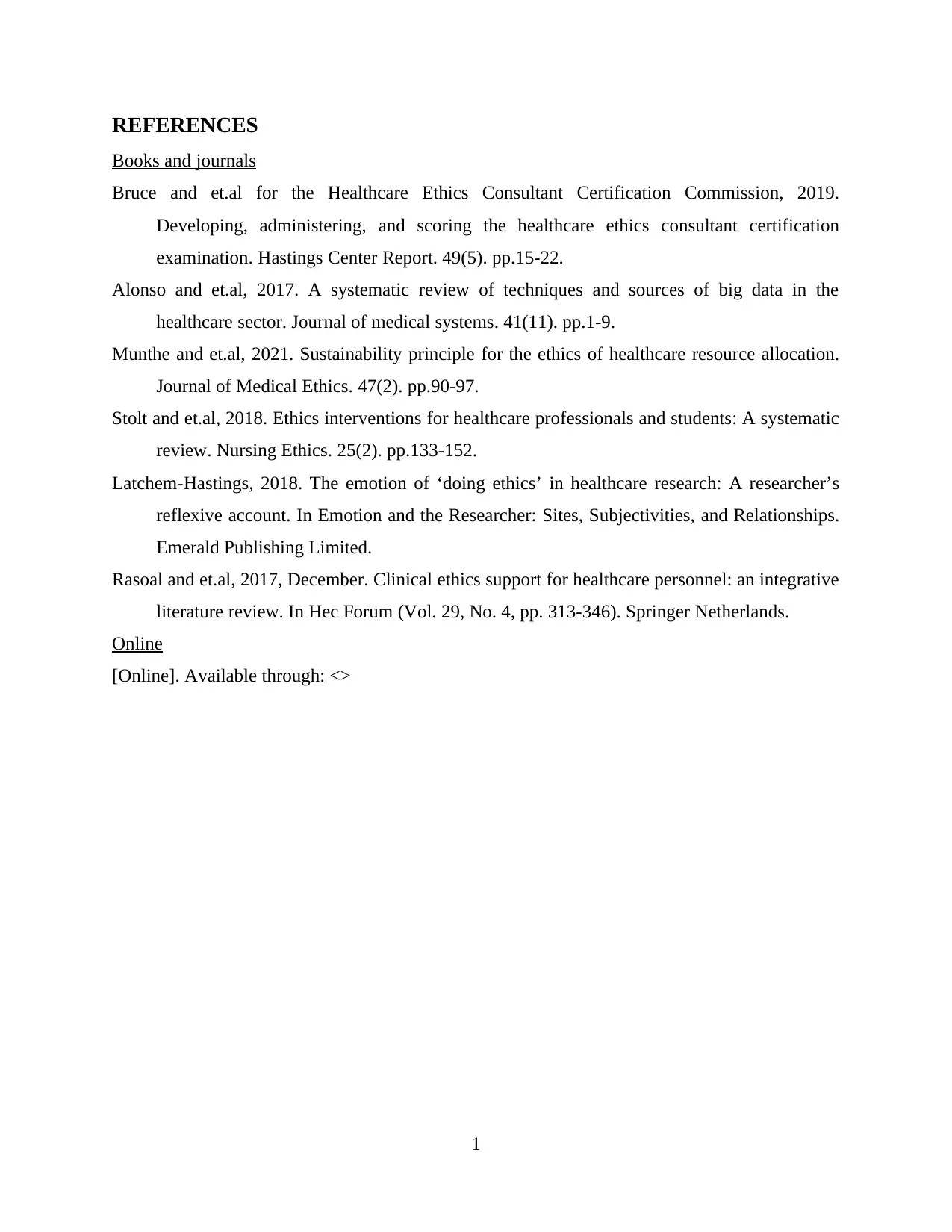
REFERENCES
Books and journals
Bruce and et.al for the Healthcare Ethics Consultant Certification Commission, 2019.
Developing, administering, and scoring the healthcare ethics consultant certification
examination. Hastings Center Report. 49(5). pp.15-22.
Alonso and et.al, 2017. A systematic review of techniques and sources of big data in the
healthcare sector. Journal of medical systems. 41(11). pp.1-9.
Munthe and et.al, 2021. Sustainability principle for the ethics of healthcare resource allocation.
Journal of Medical Ethics. 47(2). pp.90-97.
Stolt and et.al, 2018. Ethics interventions for healthcare professionals and students: A systematic
review. Nursing Ethics. 25(2). pp.133-152.
Latchem-Hastings, 2018. The emotion of ‘doing ethics’ in healthcare research: A researcher’s
reflexive account. In Emotion and the Researcher: Sites, Subjectivities, and Relationships.
Emerald Publishing Limited.
Rasoal and et.al, 2017, December. Clinical ethics support for healthcare personnel: an integrative
literature review. In Hec Forum (Vol. 29, No. 4, pp. 313-346). Springer Netherlands.
Online
[Online]. Available through: <>
1
Books and journals
Bruce and et.al for the Healthcare Ethics Consultant Certification Commission, 2019.
Developing, administering, and scoring the healthcare ethics consultant certification
examination. Hastings Center Report. 49(5). pp.15-22.
Alonso and et.al, 2017. A systematic review of techniques and sources of big data in the
healthcare sector. Journal of medical systems. 41(11). pp.1-9.
Munthe and et.al, 2021. Sustainability principle for the ethics of healthcare resource allocation.
Journal of Medical Ethics. 47(2). pp.90-97.
Stolt and et.al, 2018. Ethics interventions for healthcare professionals and students: A systematic
review. Nursing Ethics. 25(2). pp.133-152.
Latchem-Hastings, 2018. The emotion of ‘doing ethics’ in healthcare research: A researcher’s
reflexive account. In Emotion and the Researcher: Sites, Subjectivities, and Relationships.
Emerald Publishing Limited.
Rasoal and et.al, 2017, December. Clinical ethics support for healthcare personnel: an integrative
literature review. In Hec Forum (Vol. 29, No. 4, pp. 313-346). Springer Netherlands.
Online
[Online]. Available through: <>
1

2
⊘ This is a preview!⊘
Do you want full access?
Subscribe today to unlock all pages.

Trusted by 1+ million students worldwide
1 out of 9
Related Documents
Your All-in-One AI-Powered Toolkit for Academic Success.
+13062052269
info@desklib.com
Available 24*7 on WhatsApp / Email
![[object Object]](/_next/static/media/star-bottom.7253800d.svg)
Unlock your academic potential
Copyright © 2020–2026 A2Z Services. All Rights Reserved. Developed and managed by ZUCOL.





